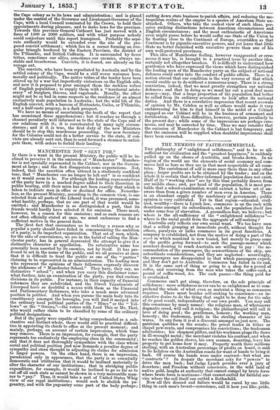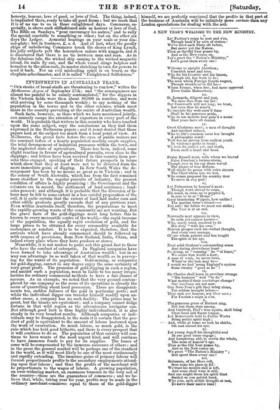TILE NEMESIS OF FAITH-COMMERCIAL.
THE philosophy of "enlightened selfishness," said to be so all- sufficient for civilization and the "greatest happiness," is suddenly pulled up on the shores of Australia, and breaks down. In no region of the world are the elements of social economy and com- merce laid so bare as they are in that most respectable of all coun- tries. The enrichment of self is more easy there than in any other place ; larger profits are to be obtained by the trader ; and on the whole it is certain that a better-informed population does not exist. Half of its "working class" are by this time probably drawn from our middle class ; and, per head of the population, it is most pro- bable that a school-examination would extract a better set of an- swers than from a given number of men even in America. There is an abundant supply of the machinery of government; public opinion is very cultivated. Yet in that region—educated, civil- ized, wealthy—there is Lynch law, commerce is on the rack with desertions amongst its subordinates, and the population itself lies under some fear of starvation. A groundless fear, we believe ; but where is the all-sufficiency of the " enlightened selfishness "- where is the social profit from the aggregate of self-seeking ? Australia only reflects our own social want. We too have seen that a selfish grasping at immediate profit, without thought for others, paralyzes or balks commerce in its great functions. A company is established, not from the motive of doing a part of the work in which mankind is now busied, but merely to grasp some of the profits going forward—to sack the passage-money which numbers desiring to reach Australia are willing to pay : the ac- commodation of the passengers, the seaworthiness of the ship, are subordinate considerations, and they are neglected : accordingly, the passengers are disappointed in that which passengers expect, and they don't get to Australia. Commerce has failed in its end. It is the same sort of thing as going to a shop for a pound of coffee, and receiving from the man who takes the coffee-cash, a pound of coffin-wood, &c. The cash passes—the thing paid for is overlooked.
Commerce can't get along, therefore, on the sole principle of selfishness : mere selfishness never can be so enlightened as to com- prehend the whole of what even so material a thing as commerce requires. There must besides self-seeking be conscience—an in- stinctive desire to do the thing that ought to be done for the sake of its good result, independently of our own profit. You may call this conscience by many names : the religious man, of whatsoever dogmatic creed, will call it religion; the philanthropist will call it love of doing good ; the gentleman, honour; the working man, honesty ; the tradesman, pride in the sterling character of his wares. In any form it is at a discount amongst us just now. The patrician quibbles in the senate; the priest trades in tithes or chapel pew-rents, and compromises his convictions; the tradesman adulterates ; his shopman pilfers, and his workman plugs the flaws in ill-wrought metal; the merchant violates his contract, and when he reaches the golden shores, his own seamen, deserting, leave his property to get home how it may. Property worth three nnlh. ons sterling, with an Australian percentage of profits on board, is said to lie helpless on the Australian coasts for want of hands to bring it back. 01 course the hands were under contract—but what are " contracts " In despair the merchant asks for " pewers " to drive the men back; but Judge Lynch presides over a jury of deserters ; and Freedom without conscience, in the wild land of native gold, laughs at authority that cannot compel by brute force where brute force is mutinous—that cannot outbid for faithful ser- vice where the soil itself can outbid a Rothschild.
Now all this discord and failure would be cured by one little thing in each man's breast—conscience, call it how you like, pride,
honesty, honour, love of good, or love of God. The thing, indeed, is implanted there, ready to take all good foams; but we teach that it is of no use to us in these enlightened days. Commerce, es- pecially, is above such oldfashioned aids as honour or love of God. The Bible on Sundays, "pour encourager lea mitres," and to rally the special constable to something or other; but on the other six -days the Ledger. Armorial bearings on your seals or your din- 'nor-plate; but in business, £, s. d. And at last, when the goodly ships of unbelieving Commerce touch the shores of sing Lynch, his jolly subjects pelt the honourless sailors with nuggets, and it is discovered that there is no tie between man and man. As in the fabulous tale, the wicked ship coming to the wicked magnetic island, its nails fly out, and the whole vessel clings helpless and homeless to the ahen rook, its master shrieking in vain for powers to send it back. For an evil misleading spirit is on board, as the chaplain-schoolmaster, and it is called "Enlightened Selfishness."

































 Previous page
Previous page